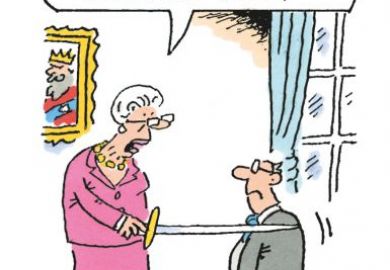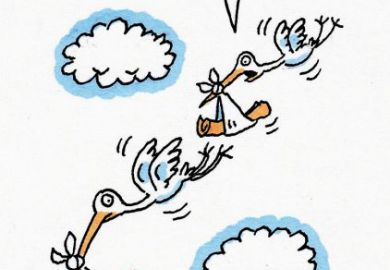
Cultural historian Fern Riddell received the traditional “Twitter backlash” after venturing the opinion that those with PhDs should be referred to as “Dr”. The Royal Holloway, University of London research associate tweeted in response to a proposal by Canada’s Globe and Mail to change its house style, so that it would refer to academics as Mr, Mrs or Ms, with only medical doctors referred to as “Dr”. She told the BBC website on 15 June that “a wave of men suddenly jumped into my mentions saying I was vulgar and immodest”. The BBC added that “women with PhDs have been adding ‘Dr’ to their Twitter handles in solidarity”. Dr Riddell – who can rest assured that Times Higher Education will defend its house style on academic titles in all contingencies, including nuclear attack – defended the principle by saying: “This is our expertise and people need to know when someone is an expert.”
The University of Kent “is set to launch an investigation to catch a mysterious ghoulish figure who has been throwing dead rabbits through open windows on campus”, the Daily Mail reported on 15 June. One student found a dead rabbit on her kitchen draining board while another was hit by a flying carcass hurled by the “phantom rabbit flinger”, as styled by the Mail. A student said: “This might sound like a daft student prank, but it’s really upsetting to find dead rabbits in your home.”
Across the world, higher education policy increasingly focuses on the concept of notional average graduate earnings deriving from different courses at different institutions. And now, the concept has legal relevance too, after a Canadian judge awarded damages of C$350,000 (£200,000) to a music student whose then girlfriend stopped him taking up a prestigious scholarship, the Montreal Gazette reported on 14 June. Clarinettist and McGill University student Eric Abramovitz was successful in his application for a scholarship at the Colburn Conservatory of Music in Los Angeles. But “scared he would move away and perhaps no longer be in a relationship with her”, his girlfriend, fellow McGill student Jennifer Lee, accessed Mr Abramovitz’s email account and deleted the message of acceptance. She then set up a fake email address under a Colburn clarinet teacher’s name and sent Mr Abramovitz a message saying that his application had been declined. In addition to an award covering the value of the scholarship, an Ontario Superior Court judge agreed that Mr Abramovitz “had lost out on two years of potential salary because of his girlfriend’s deceit, worth $71,500 [£54,000] a year,” the Gazette reported. If she is to pay what she owes, Ms Lee – whose whereabouts are unknown to Mr Abramovitz – might want to check out the figures on which postgraduate courses lead to the most lucrative careers.
As THE went to press, leaders of Glasgow School of Art were caught in a “difficult waiting game” to see if its Mackintosh building can be saved after it was gutted by a second serious fire. Flames ripped through the art nouveau masterwork on the evening of 15 June, as restoration work continued after a blaze destroyed much of the famous Mackintosh library in 2014. Muriel Gray, chair of the GSA’s board of governors, said that it was “an understatement to say everyone is utterly devastated”.
“A group that claims Harvard puts quotas on Asian-American applicants contends the university scores them higher than students of other races on academics and extracurricular activities but ranks them lowest in a ‘personal’ category covering such traits as likability and ‘attractive to be with’,” CNN reported on 16 June. A federal court filing, made in Boston, by lawyers for Students for Fair Admissions alleges that Harvard has a bias against Asian American applicants, and towards Latino and African American applicants. Harvard argues that “the statistical analyses on which the challengers rely are flawed in multiple ways” and says that the percentage of Asian American students has gone up over the past decade, CNN said. The university also said that the student group’s data analysis “failed to include applicants such as athletes and children of parents who attended Harvard or of staff at the school”, CNN added. Raising Harvard’s admissions biases as a defence must surely be seen by the university as a silver bullet in legal terms, because it doesn’t look good from any other perspective.
Register to continue
Why register?
- Registration is free and only takes a moment
- Once registered, you can read 3 articles a month
- Sign up for our newsletter
Subscribe
Or subscribe for unlimited access to:
- Unlimited access to news, views, insights & reviews
- Digital editions
- Digital access to THE’s university and college rankings analysis
Already registered or a current subscriber?





